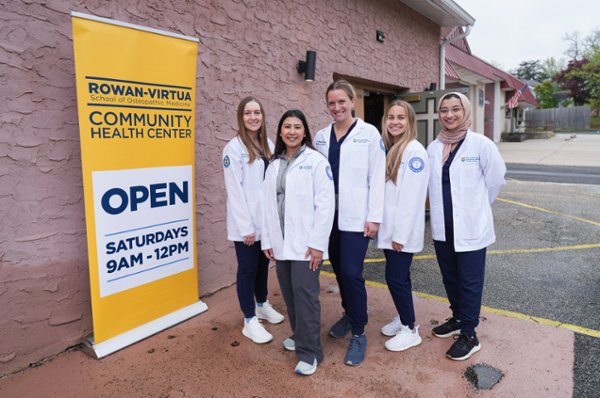Mission in practice: Rowan-Virtua Community Health Center
Mission in practice: Rowan-Virtua Community Health Center

Mission in practice: Rowan-Virtua Community Health Center
Patients travel from as far as Philadelphia, Bridgeton and beyond to the Rowan-Virtua Community Health Center, which operates twice a month out of the Commitment Community Church in Lindenwold.
At the student-run pop-up clinic, Rowan-Virtua School of Osteopathic Medicine students and physicians provide free medical care. Underserved patients can have their vision checked, receive referrals to social services and help themselves to free food and hygiene items.
“We're trying to better this patient's life, whether it's helping manage their chronic hypertension, connecting them with the social services they need, or providing them free resources,” said Emily Forester, clinic director and third-year D.O. candidate.
20+ years of providing free medical care to the underserved
Although the Rowan-Virtua Community Health Center started in Camden before relocating to the Lindenwold church, what hasn’t changed is its focus on providing free medical care to the very vulnerable: the uninsured, undocumented immigrants, non-native English speakers, and others.
“Being able to support such an underserved population in the community that doesn't have a lot of health care resources drew me to the clinic efforts,” said Forester.
For the 10 to 12 patients the clinic treats each month, the free health care amounts to so much more. Student teams, overseen by faculty preceptors, provide individual attention and a multidisciplinary, whole-person approach.
“We're able to really get down into our patients’ social health, emotional health, and physical health,” Forester said.
In addition, students volunteering at the clinic are involved in research into health literacy and rates of anxiety and depression among the underserved.
“We're looking at different components of health that may be predisposing people in this population to certain chronic conditions to improve the health care system for these patients,” Forester said.
The benefits of clinical volunteer experience
Each clinic day, a group consisting of one first-year, one second-year and one supervising third-year or fourth-year student is assigned to an individual patient. For first-year and second-year D.O. students, volunteering offers opportunities for hands-on clinical experience. In a supportive environment, student volunteers practice taking patients’ histories, checking blood pressure and performing physical examinations. More importantly, they interact with real patients whose health is more complex than the symptoms and treatments described in a textbook.
“This is real-world medicine,” said faculty advisor Nils Brolis, D.O., associate professor in the Department of Family Medicine. “You have to account for all of the social determinants of health that can influence the health of the patients.”
At the Community Health Center, students make up the executive council and handle front-desk office management duties.
“We're not just seeing the healthcare side of things but also experiencing how you would function as a primary care office,” Forester said.
When students expressed interest in delivering flu shots to the community, Brolis involved them in the entire planning process, from researching vaccine storage requirements to securing funding and developing a plan to administer vaccines.
“Our students are at the table as we're exploring the processes to make this happen,” Brolis said. “It gives you something to talk about when you're sitting down for a residency interview.”
Shaping future doctors’ medical careers
Brolis first got involved with the Community Health Center when he attended SOM, then part of the University of Medicine and Dentistry of New Jersey, as a medical student from 2007 through 2011. The experience of volunteering at the clinic “really cemented my idea to go into family medicine,” Brolis said.
“It’s rewarding that through this clinic, I can help shape students’ motivation to go into family medicine and other roles that provide service to their community,” Brolis said.
Forester, who plans to apply to general surgery residencies, noted, “Understanding how a healthcare office functions is something I can market in my future medical career.”
Embodying the spirit of osteopathic medicine
The clinic furthers the practice of osteopathic medicine and the medical school’s mission of providing care in the local community.
“Being able to understand all of the key factors that go into our patients’ health and find solutions for their problems is the essence of being an osteopath,” Forester said.
The clinic is so popular among D.O. students that there’s a waiting list to sign up to volunteer.
“Today's service-oriented students are seeking opportunities to engage in a project within the community that makes a difference and learn at the same time,” Brolis said. “The clinic is a natural fit for that learning model.”